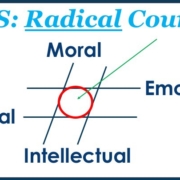13 Behaviors Draining Your Energy: The Michelangelo Principle Can Help Your Leadership Improve
Are you a leader tired of people telling you to pile more stuff – goals, reading, workshops, conferences, journaling, activities, etc. – onto your overloaded life?
a
The individual ideas sound great, but who has the time for it all? It feels like the good intentions on the road to hell.
If you are like most leaders experiencing good idea overload, you pass on capacity-building activities as nice-to-dos.
I’ll get to it when I’m not so busy.
You leave opportunities on the table for becoming ever-better, and the delays rob you of development’s compounding interest effect.
If you’re experiencing this tension, I’ve got something that will help you create more space in your rucksack, and it’s not another failed productivity hack.
Take away your time and energy vampires by following the Michelangelo Principle.
When someone asked Michelangelo how he created David, the sculptor replied that he simply took away everything that was not David.
The Michelangelo Mindset is a term I first heard from Dr. Mark Goulston about the importance of removing the obstacles in your way.
For this article, the Michelangelo Principle states that you must take away what’s holding you back to become an ever-better version of yourself.
Imagine someone piling more “good stuff” onto the marble containing David, making Michelangelo’s job harder. We might never have this work of genius.
The principle is the same for you. In this case, you want to prune away behaviors that create needless friction.
Behaviors – how you apply your standards to the people around you – separate elite leaders from everyone else. At a certain point, your skills and experiences no longer differential you. Your behaviors set you apart.
Below are fourteen behaviors that drain your time and energy. Most leaders have two or three of these behaviors. Prune these away, and you’ll save hours each week in no longer correcting miscommunication and misaligned work or having to pick up the slack that didn’t need to happen.
- Adding unnecessary value. When you improve someone’s idea by 5%, you reduce their commitment by 50%. Your employees perform far better with an 80% solution that they own than with a 100% solution you provide. You waste time and energy because you must make up for lost employee commitment.
- Offering unsolicited advice. Your good intentions create resentment by saying, “I’m better than you.” You waste time and energy by creating needless friction. Your employee is worse off, and you must pick up the slack. Ask, instead, what support you can provide to help them succeed faster.
- Winning every argument. When you insist on winning every argument, you drag out meetings, create unnecessary conflict, and undermine goodwill. Gaining people’s buy-in is more important. Once you’ve got that, shut up and move out.
- Butting in. Nothing matters before the But. The same goes for However and No. You create resentment with these words that say, “You make a good point, but my point is better than yours.” You waste time with needless input and micromanaging compliance with your mouse-turd caveats.
- Providing Constructive Criticism. Criticism builds defensiveness, which impedes progress. You waste time and energy relitigating the past, and your employee is less likely to innovate and try new things. Stop dwelling on history and start framing a better future by feeding forward: “How will you do it better next time?”
- Justifying your actions after requesting feedback. You asked for feedback on what you can do better. Your employee tells you something you do that bothers them. When you justify your actions, you imply someone other than you is at fault. They feel they stuck their neck out, wasted their time, and gained your resentment. When you ask for advice and get it, say, “Thank you.”
- Not Listening. Instead of focusing on your employee, you try to multitask. Your employee thinks they are unimportant to you, and you get only a fraction of what they said. Other times, you listen to respond (see winning every argument), so you miss their more essential points. You waste time and energy on misunderstandings and rework. Focus 100 percent of your attention on listening without passing judgment. Seek first to understand.
- Speaking (or typing) when Angry. You are guaranteed to worsen the situation by creating resentment, putting your foot in your mouth, and piling on problems. Step away from the keyboard, go for a walk, and ask, “What can I do to improve the situation?”
- Negativity fixation. You want to show how smart you are by explaining why every new idea will fail, so you stifle initiative, undermine ownership, and stay mired in a failing status quo. Ask instead, “How will you address this challenge?”
- Feeding someone’s negativity fixation. You’ll waste hours arguing back and forth with a know-it-all who’s stuck in their ways. Ask instead, “If it were possible, how would you do it?
- Letting Perfectionism impede progress. Moving from an 80 to 90 percent solution can be prohibitive in time, money, and opportunity cost, so stop waiting for perfection. Go with the 80 percent solution and adapt as needed. You’ll save time, energy, and resources while seizing opportunities that grow your business.
- Obsessive fault-finding. Some leaders treat finding an error like discovering a buried treasure. You spend so much time looking for what’s wrong that you miss seeing and recognizing what’s right. You spend time correcting faults, large and small, but fail to reinforce productive behavior, so unnecessary problems keep piling up.
- Finger-pointing. Leaders who obsess over faults tend to fixate on blame. This tendency creates predictable backlash as people try to defend themselves, cover their backsides, and re-litigate the past. While you waste all this time and energy, the problem’s cause remains. Focus on the cause, not blame, address it, and move on.
- Being the Hero. When you parachute to solve everyone’s problems and answer their questions, you become a crutch for your employees. Instead of building self-reliance, you create dependency. You rob yourself of the time to do your job, and rob your employer of the value you are supposed to provide. Instead of solving the problem for them, ask, “How would you do it?”
Are you ready to slay your time and energy vampires to become an ever-better you? I can help you zero in on the behaviors to chip away and give you the action steps you need to reveal your own David. Schedule a call here and let’s get started.










